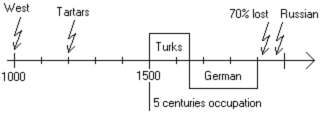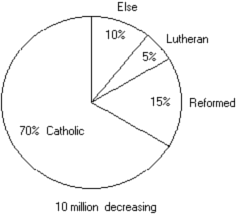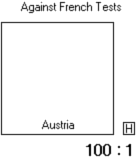
"Love your enemies!"
Cecilia Simonyi (Ms.)
I. About the history of Peace work in Hungary
First, I would like give a quick outline of the history of Hungary, with the purpose of pointing out the events and factors which have been determining to the present of the Hungarian civil movements.
1.1. A history full of foreign occupation
Hungary lies on the western edge of Eastern Europe. The Hungarian language does not belong to the Slavic, German or Latin family of languages, like all of our surrounding neighbours. It is linguistically alone from all the other European languages.

The Hungarian people (pursued from Asia and forced back by the West) occupied the Danube basin surrounded by the Carpathians in the 9th century. In the middle of the 13th century the Tartars (Mongols) massacred half of the inhabitants. Two hundred years of Turk devastation up to the end of the 17th century, also destroyed half of the population. After expelling the Turks the country belonged to the Hapsburgs (Austria).

In 1920 the powers of the Triple Entente dispossessed the Hungarian people of two-thirds of the territory of their thousand-years-old country. After the 2nd World War the German occupation was followed by the Russian occupation, to the end of the late 1980s.
Hungary is now a country of 10 million people, with 3.5 millions as minorities and 1.5 million all over the world. Considering the overpopulation on the earth Hungary is one of those countries which are special and healthy, as infact the population is slowly decreasing.
In the tenth century Hungary became Roman Catholic, Christian with the first crowned king being, Stephen. Consequently from the very beginning institutional religion and state were closely bound supporting each other. In the 16th century Protestantism found its way into Hungary with the war of independence war against the Catholic Hapsburgs.

Nowadays 70 percent of the Hungarians are Catholic, 15 percent Reformed, 5 percent Lutheran and 10 percent else, including atheists.
1.2. Decades of double oppression

In this strong base of state religion there has been no precedent or appearance of NGOs or alternative religious movements. The statepower and the clerical hierarchy were so naturally intertwined throughout Hungarian history that in the middle ages in critical moments bishops were the heads of the army. In the 2nd World War the army bishopric was even a warmonger on the side of Hitler. In spite of this nowadays we have again an army bishop, who at the same time is general in the army. After 1945 state and Church were separated — but only on paper. One part of the hierarchy was imprisoned and the other part of it which could be persuaded to obey came to terms with the state in 1950. The state kept a close eye and administered Church life in order to tolerate its existence.

Local church community life was not permitted yet still these communities existed secretly and became the birthplace of the Hungarian peacework. The Bokor (which in Hungarian means "bush", referring to the burning bush in the Bible) is a Hungarian base community network, founded by George Bulányi, a Roman Catholic monk. The Bokor was established in the beginning of 1945 promoted by the opinion that the Church of Jesus, of which the main character is non-violence ("Love your enemies!") will be able to exist only through illegally functioning small communities. Some members were sentenced to 7-15 years of imprisonment, George Bulányi was sentenced for life in 1952 by the communist dictatorship because of community work. Bokor has been living in unofficial excommunication in the Hungarian Catholic denomination, because about thirty of it’s members were in prison because of conscientious objection. The church had condemned this stand to refuse military service. Also George Bulányi has been condemned and the right to public priesthood is withdrawn from him. Nevertheless the main ideals of the Bokor (including non-violence) have become permanent controversial issues in the Hungarian Catholic denomination, and also in society as a whole.
1.3. Civil society is destroyed in this region
So you can see: in our present Hungarian society and in the mainline Churches the peace movement is not a major issue. The civil society was destroyed in this region; e.g. Austria has about the same population as Hungary and they collected 800.000 signatures against the French nuclear tests but here in Hungary 10.000 were collected only; and in a case of a Slovakian nuclear power plant which is close to the Austrian and Hungarian border, they collected in Austria 1.200.000 signatures against it, but in Hungary only 40.000 were collected. This clearly shows the way that Hungarian society has been conditioned into an apathy, that one is and can only be subservient to the state and authority. Many of the peaceprojects — about which I’ll speak later — must begin the long process of rebuilding a civil society.

II. Our reflections on peace and non-violence
2.1. The command of the Jubilee Year
The Bokor was 50 years old this year. With reference to this we emphasise the ideal of the Jubilee Year. This wonderful vision of a just and fair society is in the fifth book of Moses. It writes about the Jubilee Year, which comes after counting seven times seven years. In this certain year the slaves are left to go freely home, debtors who are unable to pay are freed from their debt. If they sold their labour or land to the creditor, they are given it back. Therefore a fair and brotherly sharing society gets the chance to be renewed in every fifty years. Here the law of love is dominant not the law of economic or political power. The main idea behind this vision is that the owner of the Earth's goods is God and we all are only the trustees of them. Extremes of wealth and poverty should not exist among God’s people. We should share our bread with the hungry people and support those who need our help. The unjust differences between certain parts of the world, are partly maintained by the world-wide debt crisis. If this vision of a society came true, that would completely change the present picture of the world.
Other very important principle of the Bokor is the one taught by Jesus of "Love your neighbour as yourself" and "Love your enemy". In other words we must treat others as we would like to be treated ourselves. We think that each kind of murdering is sin. That is why we refuse military service. A disciple of Jesus who does not share his goods with the poor and who undertakes to murder is a contradiction to the faith.
2.2. Justice, peace and integrity of creation works together
The question of peace is decisive, because it is the source of the problems of injustice and ecological destruction. These three main problems of the present are closely connected with each other.
There has to be two kinds of violence distinguished: there’s direct, bloody violence, which manifests itself in robbery and subjugation. There’s also cold, institutionalised violence (the different coercive organisations: armies, police, customs etc.) which maintain the privileges, squandering the resources from important areas of societal life and from the Third World.
On the other hand, injustice leads to violence, because the people in misery revolt for their lives. The moral solution is not to commend the revolutionary violence, but to expose this cold, often hidden violence, which is justified as legitimate by the actual power.
Violence destroys the conditions of existence. War and preparations for it, too, involve terrible environmental pollution and damages. But generally, in a war, environment is not being taken care of!
Destructing the environment is in fact indirect violence, because you attack someone if you destroy his conditions of existence (as well as the needs of coming generations).
Injustice (misery) destroys the conditions of existence. Those, who struggle for survival day by day cannot be respectful towards nature, future generations etc.
Ecological destruction creates injustice (misery), because it results, that many people lose their natural environment. Instructing examples are the busmen and similar tribes. They have lost in the battle thousand years ago (probably they were not at all willing to fight!) so they got squeezed out to territories, which are very poor in subsistent resources (moors, desert, high mountains) Ironically they have perfectly managed to adapt to the "destroyed" environment (by keeping their number and consumption stable) and are living happier than the agressive winners.
Some groups of "weak" people living at the bottom of present societies give us a model of a way of life based on another values.
2.3. Is it possible to satisfy our endless wishes?
As far as I see, the main root of violence is that people fail to recognise the sense of a life, which is based on modest material resources (which everyone could gain if shared out fairly), and on richness in spiritual and intellectual wealth (e.g. inner world, creativity, art, nature, knowledge) and in personal relationships (friendship, love, children, community, helping each other etc.). This is why they try to grow in material wealth and want to possess, not to experience also non material things.
If people’s personal wish towards an Almighty and for an eternal life aims towards a false goal, it will be attracted by money and wealth which seem to be often superficially almighty and to multiply themselves forever. Theologically people who fail how to wish to live for ever, with ever-increasing wealth in the form of money, have not understood what a "good life" is, i.e. a life in community, and in the end destroy themselves. Aristotle points to the myth of King Midas, who wished that everything he touched would turn to gold. This was his downfall, since even his food turned to gold and so he starved to death.
In materials this attitude leads to dissatisfaction with a modest amount of wealth which would belong to one in case of a fair use and sharing of resources; people seek for privileges and try to gain more and more, leaving therefore less and less for others.
This fight becomes demonic through violence: natural differences (people with better health, more IQ, more valuable place for living, better family background etc.) grow increasingly high, carousal and misery develops.
The existence of misery and merciless violence certainly excites such a fear, that people do not dare to live simply anymore, but try to accumulate a material security with which they excite the fight further.
The way out is non-material richness as well as the sense of security arising from faith and communal trust, which creates a good model in small circles, a normal life, which will gradually infiltrate the whole society.
Setting out from the main cause above: the character of the human has to be cured.
So when we’re working for money, usually we do unnecessary things, sometimes even harmful. (Who is able to pay, anyone will do for him what he wants. Noone’d miss us if we got unemployed, ten people would step into our place at once. At the same time, with the elementary needs of those who cannot pay the economy doesn’t bother.) The majority of the jobs is existing not to produce something necessary, but to employ people so that they live on it, though — considering the interest of the whole humankind — they do useless moreover harmful things by their work. Already Aristotle has distinguished two kind of economies: needsatisfying and moneymultiplying economy. The ethic of work should be restored: we must work for our life, our existence, but on a very modest way in order to leave also for others and to live sustainably. The busmen when they bring down a wild they apologize to it. They tell it, that they needed his meat and than thank him; but don’t kill more than what the family needs. A redistribution of the injustice between the few rich and the many poor of this world needs to be achieved through the redirecting of the world economy. Without such action, we shall never be able to live in harmony with each other.
III. Movement experiences
3.1. Lobbying
Today there is possibility of alternative service in Hungary — though it is one and half times longer then military service, and there have been few people (3 % of the drafted young) interested in choosing it. I was a newborn, when the fight began for the freedom of choice and sixteen when it finished. Though child and woman I had come to personal experiences quite early: my father was between the first from the thirty members who were in prison for 1-3 years from the end of the 1970's until 1989 because of conscientious objection. I was that time six years old, but ever since I have been naturally living in and involved in our peacework.
Together with other organisations, after achieving repeal of death penalty in 1991, now we are working for the abolition of conscription.
One of the projects which besides help to rebuild the civil society here is the World Court Project. I think this campaign for banning nuclear weapons is quite known. In Hague, the International Court of Justice has began to hear this case this summer and the first time they have allowed citizens' evidence. In Hungary our BOCS Foundation have started with collecting signatures this spring. By this time it is around the amount of 4000.
3.2. National and international connections
In the latter half of 1960's, we began to support Christian care and education projects in the third world. From the 1970’s this have been focused on supporting a boarding school system in India, established and organised by an Indian Jesuit priest. The system consists of 90 boarding schools giving place for about 15.000 children from the poor.
We’re holding a close connection with the ethnic Hungarians around, lecturing for religious eco or peace groups in Rumania and Slovakia, supporting (by aid and publications) COs in ex-Yugoslavia. 1993, 90 tanks surrounded a little Serbian village, Oromhegyes because 200 men refused to join up. They gathered together in the cultural centre of the village and stayed together for three month long. Thousands of people escaped abroad, for whom asylum had to be obtained.
We have connections with many international peace organisations. Church and Peace, a European network of historical peacechurches and non-violent groups of different denominations, makes the greatest efforts among the Christian peace organisations to involve East-Europe. As the Hungarian workgroup of the International Fellowship of Reconciliation (IFOR), a 76 year old international, interreligious peaceorganisation, we take part in their international issues. I hereby have to mention the World Conference on Religion and Peace, with which our connection has been quite young. They’re working at this area very widely and effectively, and have a large group also in Japan. There have been a deep and personal contact with an Anabaptist non-violent church, the Hutterites since the end of the 1980’s. (They have a group also here in Japan.)
3.3. Peace education
Peace education is running on many ways in the Bokor, which ways have long-standing history and practise through the generations.
There are many little groups on different places and in different ages in which mostly intellectual and spiritual work is going on during the year. I also have a group of 5-year-old kids. In our summer camps characteristic are the hermitage-days on which the people have to spend a certain time (depending on the age-group from 5 hours to a whole day) alone in the nature listening to the environment and to themselves.
3.4. Publications
From the end of 1960's we published illegally ("samizdat") more than two hundred volumes of community writings and translations. In 1990 we started our newspaper, "Érted vagyok", (which means "I'm for you", from Exodus 3:14) to address such issues as non-violence, radical renewal movements in the main churches, social and third world problems, ecology, education, family and community life, etc.